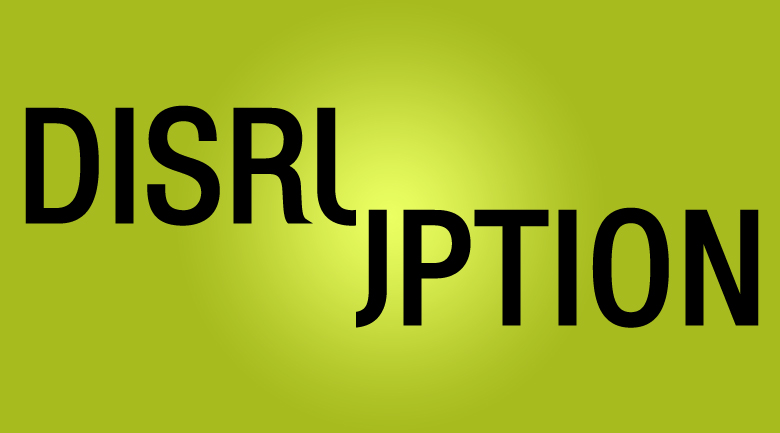
Market disruption or maybe a paradigm shift
I am currently sitting in a restaurant that caused quite a market disruption. By disruption, I mean that their food gave me a stomach ache and it’s disrupted my work day. Well, I’m not sure if it was really disruptive. It might just have caused a paradigm shift.
In increasing number this year, there have been a series of popular articles arguing about the (possible) shift in how small businesses now successfully usurped established organizations. The foundational book that defines much of the business school discussion is “The Innovator’s Dilemma” by Clayton Christenson. The term largely in play is ‘disruption.’ If you want to learn more about it, just ask any recently graduated MBA student or spend six figures for an hour of Christenson’s time. Your choice (note: you can comfortably ask ANY MBA student – whether from the University of Phoenix or Harvard, because they are all learning this same thing).
For those who stay away from these types, here’s a haphazard summary of Christenson’s thesis: small businesses disrupt the market by focusing on cheap/low end needs while the big organizations cater to the luxury crowd. It would seriously be in your best interest to talk to someone from McKinsey about his thesis, though, because I’m probably off here, but you get the gist.
I’ve spent the last 10 years interacting with ‘thought leaders.’ Much of the time, I am fascinated by the insight that people offer into human behavior and business. Often, though, I find myself looking around just waiting for someone else to yell “seriously? What the hell are we talking about again?” Here’s what frustrates me:
1. Word games are fun for everyone
I’m a communication guy, so words are particularly interesting to me. What I find most interesting is the way words change in their usage over time. For instance, back in the days of Zig Ziglar- the term motivational speaker was reserved for the few who motivated masses of people. Then, others started using the term to benefit by associating with Ziglar’s work. We eventually end up with Chris Farley in a van down by the river.
The point? Words change meaning. And yet, people spend hours of energy fighting over the terms that define concepts that attempt to explain business phenomena. Why? I’m not sure, but it brings me to my next point.
2. Enough with descriptions and definitions
I am certainly not one to say that it’s not helpful for entrepreneurs to understand the nature, market conditions, and past recipes of successful entrepreneurial endeavors. Except I don’t think it is.
Look- most small businesses fail. Some succeed. There are small businesses who offer luxury products that fail, and those that succeed. There are small businesses who succeed by capturing the ‘quality at a cheaper price’ market, and those that fail.
There are a number of reasons for this… Bad luck. Under-capitalization. Too much booze. Not enough Adderall. An annoying spouse. Traffic.
You know what will not help a new entrepreneur? Theories in market disruption. Perhaps I’ve read too much of Nassim Nicholas Taleb, but I fall squarely into the camp that argues that past descriptions of ‘this is what happened’ don’t do a whole lot to accurately tell me on a micro level what I should do.
3. Small business versus The Man
Here’s my highly comprehensive research on the market disruption debate (please insert however many big adjectives necessary to truly understand that what I’m about to say next is authoritative).
Big businesses like to be safe. Why? Because risks aren’t rewarded. Sure, the organization needs to risk, but the individual in the organization certainly doesn’t. As a business manager in big company, you can be told all day long that you need to innovate, but if you do and succeed – you get a tiny bonus… if that. If you risk and fail? That 20 million dollars you just wasted means you get to start looking for a new job.
I don’t blame you if instead you choose to spend most of your day reading articles about innovation and risk- and I appreciate you reading and referencing mine in particular.
Small businesses need to take risks. We must be agile. Why? Because we want to eat. The risk/reward and/or benefit analysis results in a completely different sort of decision making.
Now, let’s describe this phenomenon more and categorize it and argue about the words so that we can be really helpful to everyone. Hmmm.
4. Let me give you more information about a subject
Here’s the real rub. You don’t need more information. I recently spoke to a professor who told me the papers he receives from students include the most lengthy bibliographies he’s ever seen… with the worst analysis he’s ever seen.
We live in an age where information is available and abundant. We love to access it, but the problem is that we don’t know what to do with it. And the more time we spend seeking it, the less we have to take the risks to analyze and act.
And in conclusion
Personally, put me squarely in the camp of ‘not giving a crap’ as to whether the current market has shifted in terms of the types of disruption. I’m too busy growing a business.
Curt Steinhorst loves attention. More specifically, he loves understanding attention. How it works. Why it matters. How to get it. As someone who personally deals with ADD, he overcame the unique distractions that today’s technology creates to start a Communications Consultancy, The Promentum Group, and Speakers Bureau, Promentum Speakers, both of which he runs today. Curt’s expertise and communication style has led to more than 75 speaking engagements in the last year to organizations such as GM, Raytheon, Naval Academy, Cadillac, and World Presidents’ Organization.







































